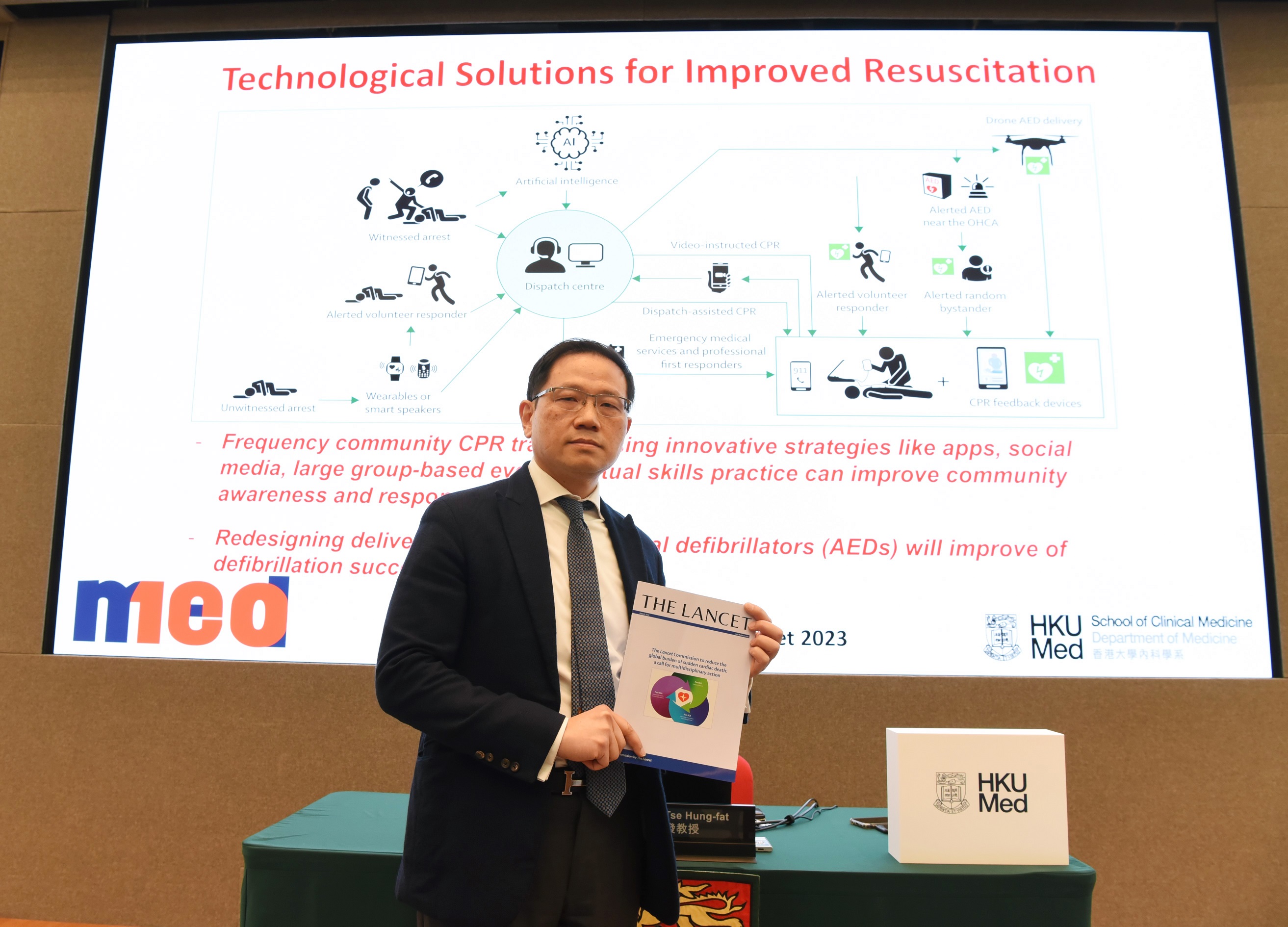31 August 2023
Download Presentation Slides
Download Glossary
Globally, sudden cardiac death (SCD) claims millions of lives each year. In view of the complex interplay of various factors involved in SCD, the Lancet Commission to Reduce the Global Burden of Sudden Cardiac Death was established on 27 August 2023 at the European Cardiology Congress in Amsterdam, the Netherlands. Around 30 international experts of diverse medical disciplines, including Professor Tse Hung-fat, Chairperson of the Department of Medicine, School of Clinical Medicine, LKS Faculty of Medicine, the University of Hong Kong (HKUMed), formed the Lancet Commission. They made bold recommendations to activate the global community in reducing the burden of SCD in the next decade.
Background
Despite major advances in cardiovascular medicine, SCD continues to be an enormous medical and societal challenge, claiming 4-5 million lives every year worldwide.[1] In Hong Kong, males have a moderate risk of SCD or sudden cardiac arrest (SCA) estimated at 40 per 100,000 in population.[2] To address the global burden of SCD, the Lancet Commission was therefore established to call for international collaboration and multidisciplinary action, including not only the varied medical specialties, such as cardiology, critical care, emergency medicine, epidemiology, genetics, neurology, pathology, primary care, and public health, but also dietetics, nursing, occupational therapy, paramedics, physiotherapy, as well as healthcare policy and decision-making personnel.
Key Findings and Recommendations
Before the event
For more effective prevention of SCD, the Lancet Commission called for more research to boost the current capabilities of predicting the risk of coronary artery disease, the main cause of SCD. A particular focus should be given to identifying potential indicators of high-risk individuals, and to improving current knowledge of genetic risk for common SCD. ‘Emerging technologies from genetics to artificial intelligence, wearable sensors and big data, as well as “omics” imaging should be applied where appropriate to help achieve an effective reduction of SCD in the next decade,’ said Professor Tse.
During the event
Survival from SCD is unacceptably low at less than 10% in most countries,[3] because SCD often takes place unexpectedly and out of hospital. Many large clinical trials investigating into novel resuscitation interventions have made little success in raising survival rates.
‘To attain higher survival from SCD, we may need re-evaluation with an individualistic approach, taking into consideration the underlying causes and individual response to therapy. Focused studies in pharmacogenomics and epigenetics among populations at risk for SCD will also be useful in identifying new targets for therapy,’ said Professor Tse.
‘In the long run, genetic testing should be expanded and made affordable everywhere in the world, including Hong Kong. This would allow precise data and more targeted solutions for better care of SCA patients, thus improving survival rates and reducing the burden of SCD,’ he added.
After the event
In view of the complexity of SCD causes, a more comprehensive and patient-centred approach is recommended by shifting from a ‘one size fits all’ to a more individualised approach in resuscitation care research, taking into consideration the underlying causes and characteristics of SCA and patients’ response to therapy.
A full postmortem investigation is crucial to determining the cause of SCD. However, autopsy cases have been declining and there are concerns over the quality of autopsy performed around the world. This further illustrates the importance of developing precise medicine based on genetics and enabling wider access to patient data for further research.
To facilitate rapid response and timely care for SCA patients, community CPR training is highly desirable. Making CPR training a mandatory requirement for secondary school graduates or new drivers to obtain a driving licence may be considered. It is also important for automatic external defibrillators (AEDs) to be registered, easily accessible and linked directly to the emergency medical dispatch system.
To drive research and facilitate public health policy decisions, SCD registries are also proposed. Engagement with policy-makers, clinicians, first responders and community leaders is essential to achieve optimal impact.
‘In Hong Kong, acute coronary syndrome and coronary artery disease account for 45% as the cause of SCD among residents aged 35 and below, majority of which occurs in “apparently healthy subjects”. To improve the survival rate of SCD, there has to be a change in the paradigm of SCD prevention, by adding near-term prevention and pre-emptive action to long-term prevention. Frequency of community CPR training using innovative strategies like apps, social media, large group-based events and virtual skills practice can improve community awareness and response,’ concluded Professor Tse.
[1] Empana J-P, Lerner I, Valentin E, et al. Incidence of sudden cardiac death in the European Union. J Am Coll Cardiol 2022; 79: 1818–27.
[2] Hai JJ, Tse HF. Unpublished data
[3] Sasson C, Rogers MAM, Dahl J, Kellermann AL. Predictors of survival from out-of-hospital cardiac arrest: a systematic review and meta-analysis. Circ Cardiovasc Qual Outcomes 2010; 3: 63–81.
Media enquiries
Please contact LKS Faculty of Medicine of The University of Hong Kong by email (medmedia@hku.hk).


Follow HKUMed